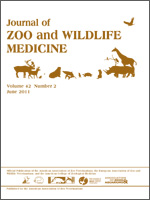Blood transfusions are a common therapeutic procedure in small animal medicine and have been investigated in some exotic species but little information is available about their safety and efficacy in reptiles. In human pediatrics and small animal practice, the Hemo-Nate®18-μ filter is used to prevent embolic clots and particulate waste from entering the recipient during a transfusion. The goal of this study was to determine the hemolytic effect of an 18-μ Hemo-Nate filter for whole blood cell transfusions in reptiles using the American alligator (Alligator mississippiensis) as a reptilian model. Results revealed no significant difference in free plasma hemoglobin between the unfiltered and filtered samples (P = 0.21). There was no difference in the prefiltration and postfiltration packed cell volume (PCV) (P = 0.41). Results suggest that an 18-μ Hemo-Nate filter does not cause hemolysis or decrease the PCV of small quantities of alligator blood.
How to translate text using browser tools
1 June 2011
Evaluation of an 18-Micron Filter for Use in Reptile Blood Transfusions Using Blood from American Alligators (Alligator mississippiensis)
Javier G. Nevarez,
Jennifer Cockburn,
Michael T. Kearney,
Joerg Mayer
ACCESS THE FULL ARTICLE
Alligator mississippiensis
American alligator
blood filter
Blood transfusion
hemolysis
reptile





